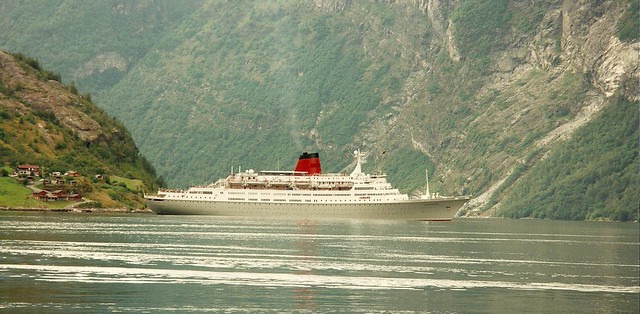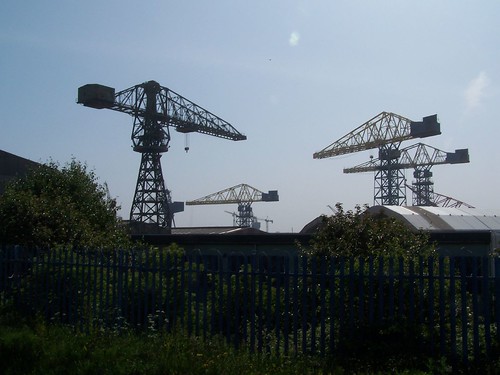Set in the village of Wallsend-on-Tyne in northeastern England, the show is a stylized account of the conclusion in 2007 of shipbuilding activity by Swan-Hunter, whose accomplishments include the legendary Cunarders RMS Mauretania (holder of the transatlantic speed record) and Carpathia (rescuer of the RMS Titanic survivors). Wallsend produced the last passenger liner built in the United Kingdom (the MS Vistafjord for Norwegian America Line, which later also sailed for Cunard as Caronia) in 1973.
 |
| MS Vistafjord, the last liner built in the UK, shown here in Cunard colors at anchor in Some rights reserved. |
The show begins with a flashback of sorts, as Joe Fletcher (Jamie Jackson) is injured on the job and wants his son Gideon (Montclair's own Collin Kelly-Sordelet) to assume his place as breadwinner by becoming an apprentice at the yard. Gideon rejects this idea and instead signs on as a merchant mariner, promising girlfriend Meg (Rachel Tucker) he will be back for her.
Returning fifteen years later upon the news of his father's death, Gideon (played as an adult by Michael Esper) learns that the yard is to be closed for lack of any further work. This is semi-factual: Following delays and cost overruns, the still-incomplete HMS Lyme Bay, the last vessel to be laid down at Wallsend, was towed in 2006 to a competing yard and Swan Hunter was barred from further naval contracts, ending 130 years of shipbuilding on the Tyne.
Gideon seeks out Meg and discovers she is less than receptive to a reconciliation, her feelings complicated by a teenage son Tom (also portrayed by Kelly-Sordelet) and another man, Arthur (Aaron Lazar), who wants to marry her. Arthur (also a former shipbuilder) has taken a job with a company that wants to see the yard sold and used for shipbreaking and scrapping, an idea the workers find repulsive and insulting.
Encouraged by the parish priest (brilliantly wrought by Fred Applegate... if ever there was a right priest for a particular congregation, Fr. James O'Brien is it!), the workers, including Gideon and Tom, defiantly embark -- against all odds -- on one more project, which symbolizes their collective well-being and pride.
 |
| In 2007 the Wallsend cranes, which had dominated the skyline for generations , were dismantled and shipped to India. PHOTO CREDIT: Mick Gallagher. Used under Creative Commons license. Some rights reserved |
"My father was... snatched away from me at the wrong time. For me and for him. It was just at the point when I was beginning to make my journey home and understand my parents more - the decisions they made," Sting observed. "Having written the songs, what I learnt was to forgive myself for my part in it and forgive my father and my mother for what they did that hurt me."
In parallel, Gideon misses Jim's funeral by mere days and is forced to work through unrequited feelings as the story unfolds. Two tracks from The Soul Cages, "Island of Souls" and "All this Time", accompany original songs in the show.
The play gives you a lot to chew on. The theme is one that has repeated itself many times, some of them in places a lot closer to home, as traditional ways of earning a living handed down by generations give way to technology and globalization.
Layer that with the complex relationships between the players as they make difficult choices, and a cast that does well to get you invested as if this was really happening around you. Musically, Sting's influence is heavy, but he draws well from the history of the area, particularly for the company pieces.
The Last Ship is in previews at the Neil Simon Theater.

